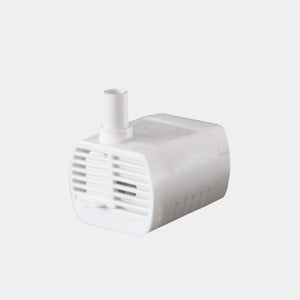Reading time: 7 minutes
Dry mouth in the morning and snoring at night are two common complaints that disrupt the sleep of millions of people. For those affected and their partners, this often represents a significant burden that can negatively impact health and quality of life. In this comprehensive article, we explain the causes of these complaints and present seven practical, scientifically based solutions.
Why do snoring and dry mouth occur?
Snoring is a mechanical process in the upper respiratory tract . It occurs when relaxed tissue in the throat vibrates due to the airflow. These vibrations cause the typical snoring noise, which can range in intensity from mild to very loud. The areas primarily affected are the soft palate, the uvula, and the lateral pharyngeal walls.
Dry mouth in the morning is often a direct result of nighttime mouth breathing, which is particularly common in people with snoring problems. Constant mouth breathing during sleep dries out the mucous membranes. This not only weakens their protective function against pathogens but also reduces saliva production. The reduced saliva flow, in turn, impairs natural mouth cleansing and can lead to various complaints.
How do you recognize the problem? 
The signs of snoring and the associated dry mouth are diverse and often intertwined. Morning dry mouth is one of the most obvious symptoms, and the first thing many sufferers notice. Upon waking, the mouth feels fuzzy and unpleasantly dry, often accompanied by a stale taste. In addition, partners report snoring at night, which can vary in intensity.
Many sufferers also notice hoarseness in the morning, which improves over the course of the day. This is a direct result of mouth breathing at night and the associated drying of the mucous membranes in the throat. Increased thirst in the morning is also a common symptom, as the body attempts to compensate for the lack of fluid in the mucous membranes.
Particularly worrying is the frequent occurrence of fatigue despite seemingly adequate sleep. This indicates that sleep quality is being impaired by snoring and disrupted breathing. In some cases, this can even lead to a form of sleep apnea, in which brief pauses in breathing occur during sleep.
The first three approaches
1. Optimizing your sleeping position
Sleeping position plays a fundamental role in the development of snoring. Sleeping on your back is particularly problematic, as gravity can cause the tongue and soft palate to fall backward, narrowing the airway. An effective solution is practicing side sleeping. This often requires patience and consistent practice, as many people unconsciously return to their usual sleeping position during the night.
Support from special positioning pillows can be very helpful. These pillows are designed to keep the head and neck in an optimal position, which helps keep the airways open. The so-called tennis ball technique has also proven to be a practical method. A tennis ball is attached to the back of the pajamas, preventing the patient from rolling back into the supine position. Over time, the body develops a natural preference for sleeping on its side.
2. Strengthening the throat muscles
The muscles in the throat play a central role in the development of snoring. Weakened muscle tone causes the tissue to relax more during sleep and thus vibrate more easily. However, targeted exercises can effectively strengthen these muscles, which can significantly reduce snoring.
Training the throat muscles should be done regularly and with patience. One effective exercise is tongue pressing against the roof of the mouth, in which the tongue is pressed firmly against the roof of the mouth for about 30 seconds. Systematic tongue movements in all directions can also help strengthen the muscles. Humming and yawning exercises also activate the muscles of the soft palate. Swallowing exercises with pursed lips specifically train the muscles involved in swallowing.
3. Adjusting evening rituals
What we do in the hours before bedtime has a direct and significant impact on our snoring behavior. Avoiding heavy meals at least three hours before bedtime is an important aspect. Heavy meals shortly before bedtime can lead to increased relaxation of the throat muscles, promoting snoring.
Alcohol consumption in the evening should also be reduced or avoided altogether, as alcohol further relaxes the muscles and thus increases the risk of snoring. Fluid intake should be spread throughout the day, not just in the evening, to minimize nighttime disturbances. An important, often underestimated aspect is the integration of relaxation exercises into your evening routine. These can help reduce stress and create optimal conditions for restful sleep.
4. Regular exercise and weight control

Obesity is one of the most significant risk factors for nighttime snoring. The extra tissue in the throat area can constrict the airways and thereby significantly worsen snoring. A moderate, regular exercise program is therefore an important component in managing snoring problems. This involves not only weight control but also improving general muscle tone, including the throat muscles, which are important for breathing.
Regular endurance training such as hiking, swimming, or cycling is particularly suitable. These activities not only improve overall fitness but also breathing capacity. Yoga or Pilates can also be very beneficial, as they not only provide physical activity but also improve body tone and body awareness. Targeted strengthening of the neck and shoulder muscles through specific exercises can also help improve posture and thus keep the airways open.
Daily walks in the fresh air are a simple yet effective way to stay active while stimulating your respiratory system. Exercise in nature also has a positive impact on stress reduction and overall sleep quality.
5. Optimizing the sleeping environment
The sleeping environment plays a central role in the quality of our night's sleep and has a direct influence on snoring. Regular and thorough ventilation of the bedroom is essential. Fresh, oxygen-rich air facilitates breathing and can reduce the tendency to snore. Ideally, the bedroom should be briefly but thoroughly aired again before going to bed.
The optimal room temperature is between 16 and 18 degrees Celsius. This cool, but not cold, temperature promotes restful sleep and prevents mucous membranes from drying out due to excessively warm, dry air. A dust-free environment is also crucial, as dust particles can irritate the respiratory tract and aggravate snoring. Regular vacuuming and mopping, as well as changing bedding and pillows, are therefore important measures.
Choosing the right mattress and pillow is another important consideration. These should enable optimal head and body posture, which keeps the airways open. A pillow that's too high or too flat can impair breathing and promote snoring.
6. Breathing techniques and relaxation exercises

Targeted breathing exercises before bedtime can have a positive impact on nighttime breathing. Conscious breathing through the nose is particularly important. Nasal breathing filters, humidifies, and warms the inhaled air, thus contributing to healthier breathing. Regular nasal breathing exercises can help maintain this even during sleep.
Diaphragmatic breathing training is another important technique. This breathing technique utilizes the diaphragm optimally, leading to deeper and more efficient breathing. Jacobson's progressive muscle relaxation can also be very helpful. In this method, different muscle groups are tensed and relaxed one after the other, leading to deep physical and mental relaxation.
Meditation before bedtime can further promote relaxation of the respiratory system. This not only promotes physical relaxation, but also reduces stress, which can negatively affect breathing. Even a few minutes of conscious meditation can make a noticeable difference.
7. Adequate humidification of the respiratory tract
Proper airway humidification is essential for free breathing and can significantly reduce snoring. Regular nasal rinsing with an isotonic saline solution not only cleanses the nasal mucous membranes but also moisturizes them and reduces swelling. This simple measure can make a significant difference.
Saltwater inhalation is another effective method for moisturizing the respiratory tract. The fine saltwater mist penetrates deep into the airways and can loosen trapped mucus. Adequate fluid intake throughout the day is also important to keep the mucous membranes well hydrated from within.
Using a humidifier can keep the humidity in the bedroom at an optimal level. This is especially important during the winter months, when the air from heating further dries out mucous membranes.
The role of humidity
An often overlooked but crucial aspect is the quality of the air we breathe while sleeping. Dry air can further dry out mucous membranes and exacerbate snoring and dry mouth in the morning. Balanced humidity and, above all, enriching the air with natural mineral salts can significantly improve this.
The importance of humidity for respiratory health has been demonstrated by numerous studies. Optimally humidified airways can perform their natural cleansing function better and are more resistant to irritation and inflammation. This has a positive effect on snoring and can significantly alleviate the symptoms of morning dry mouth.
A natural way to recovery

Many people report a significant improvement in their nighttime respiratory problems after spending time by the sea or in a salt cave. The salty air has a naturally moisturizing effect on the respiratory tract and can provide lasting care for the mucous membranes. However, this positive effect doesn't have to be limited to vacations – with our mini saline bath, you can easily bring the soothing effects of salt air into your bedroom. Continuously enriching the room air with mineral salts can help keep the respiratory tract moist and reduce the risk of nighttime snoring.
Conclusion: Your path to more restful sleep
Combating snoring and dry mouth in the morning often requires a holistic approach. The seven solutions presented here offer you various options for actively combating these problems. It's important to understand that not every method works equally well for everyone. Experiment with different combinations and observe which measures produce the best results for you.
The combination of several approaches is often particularly effective:
· The optimization of the sleeping position and sleeping environment as a basis
· Regular exercise and breathing exercises to strengthen muscles
· Adjusting your evening routine for better sleep quality
· Support from natural aids such as salty air
With patience and the right combination of measures, you can significantly alleviate your symptoms. Your partner will thank you, and you yourself will benefit from more restful, healthier sleep. Remember: High-quality sleep is an important foundation for your health and well-being.



